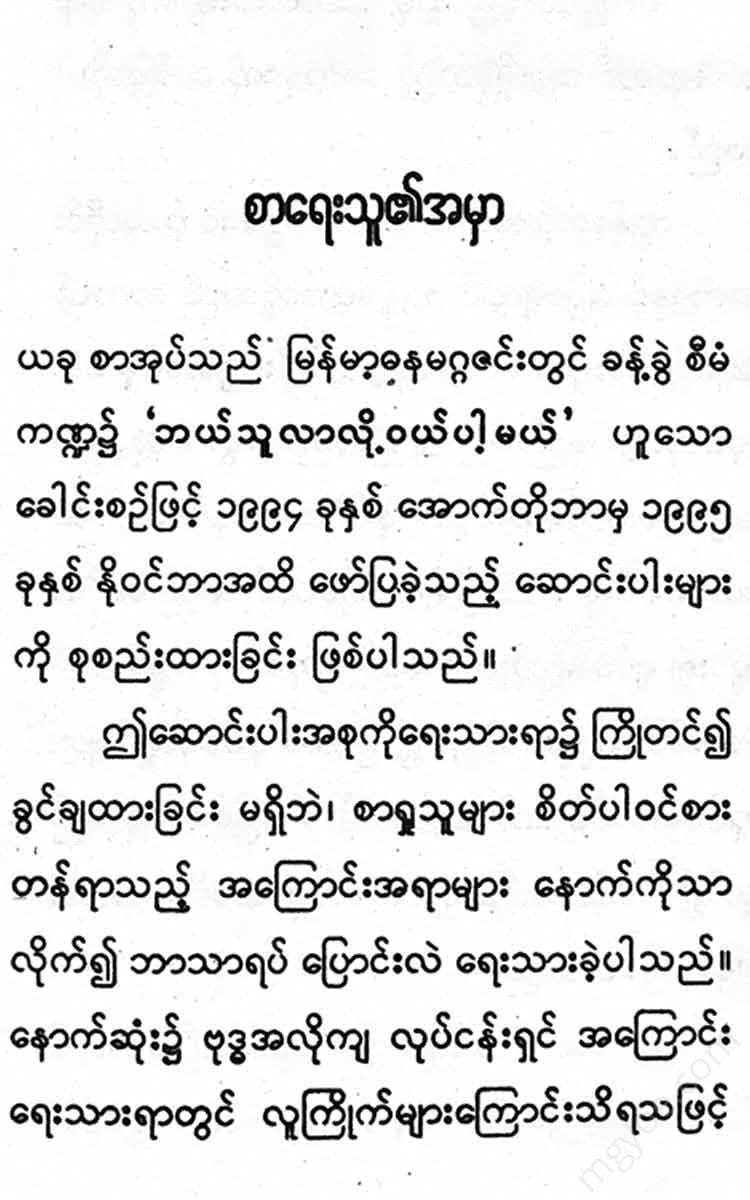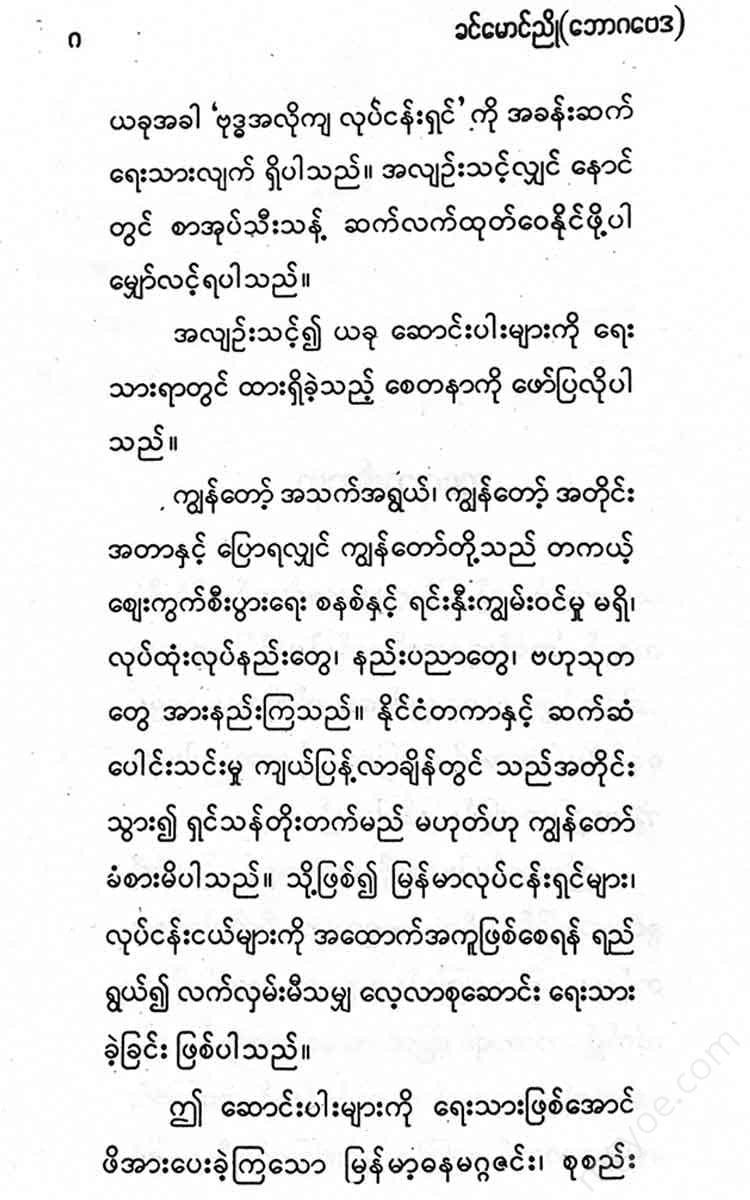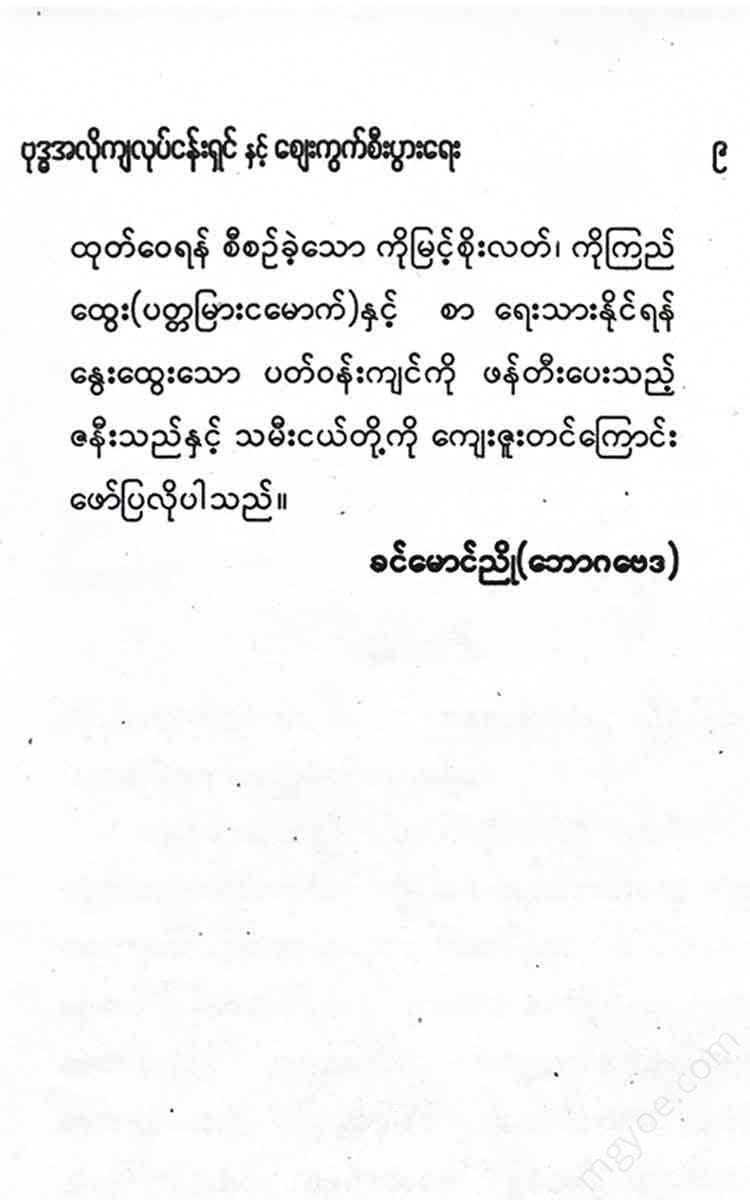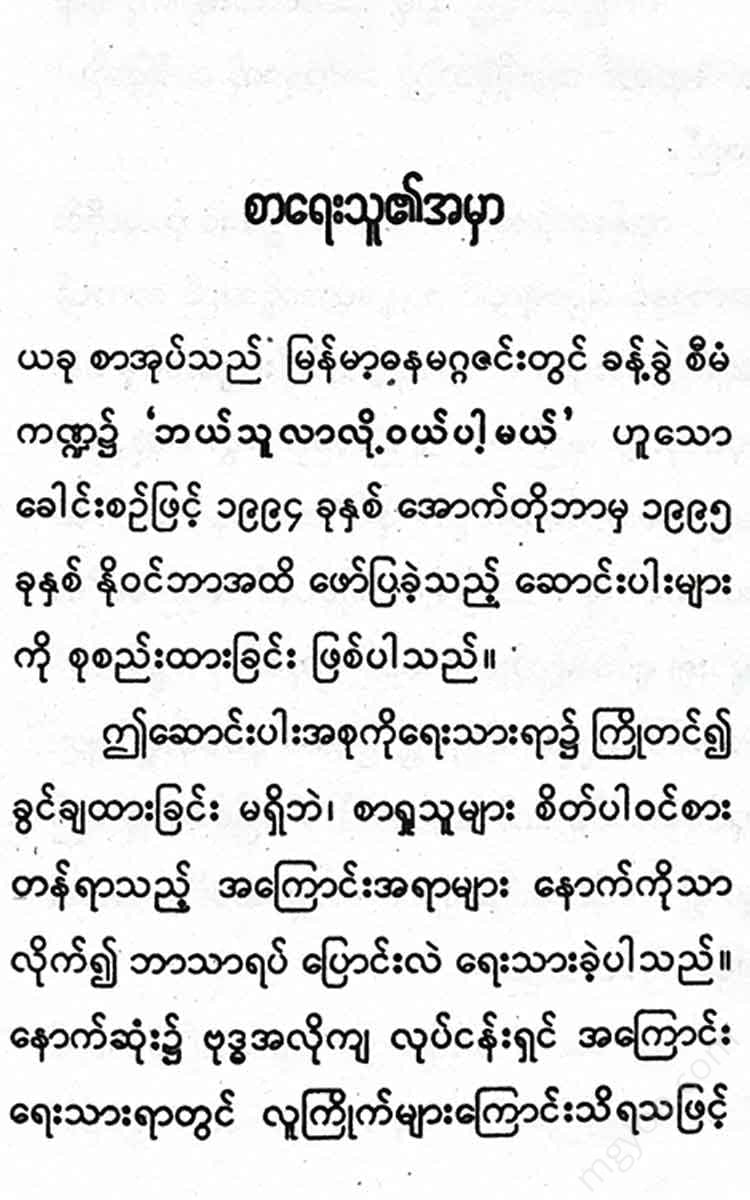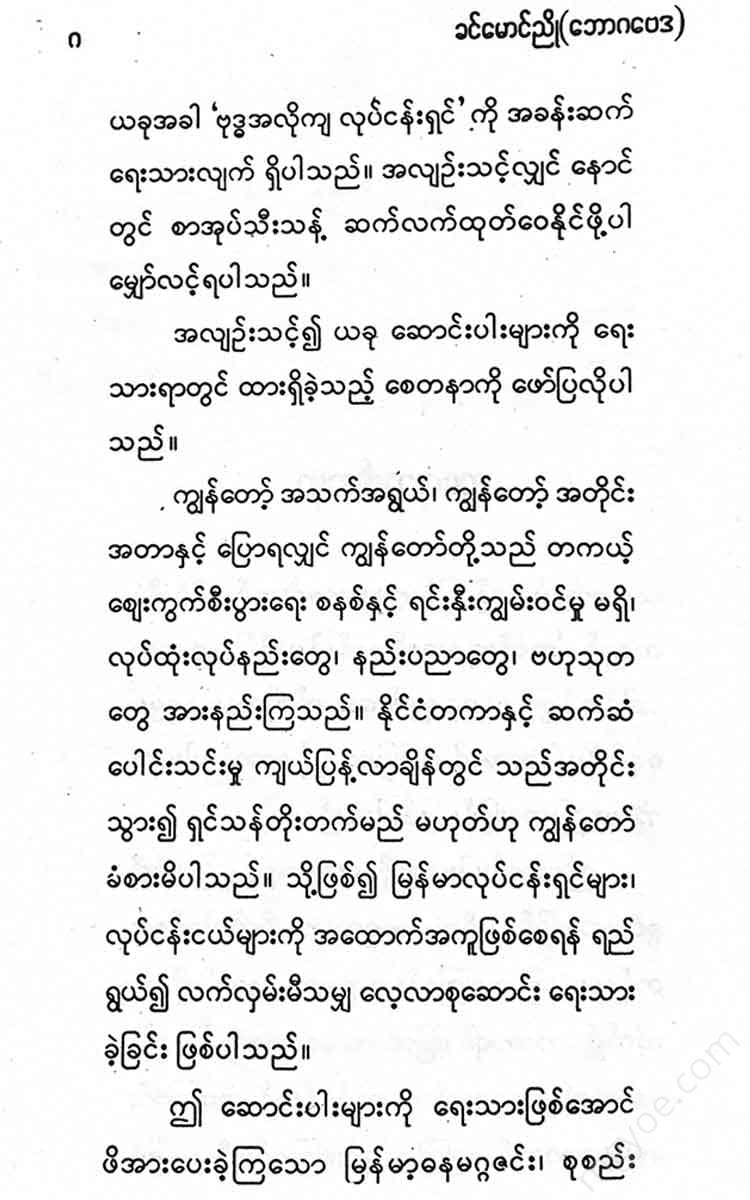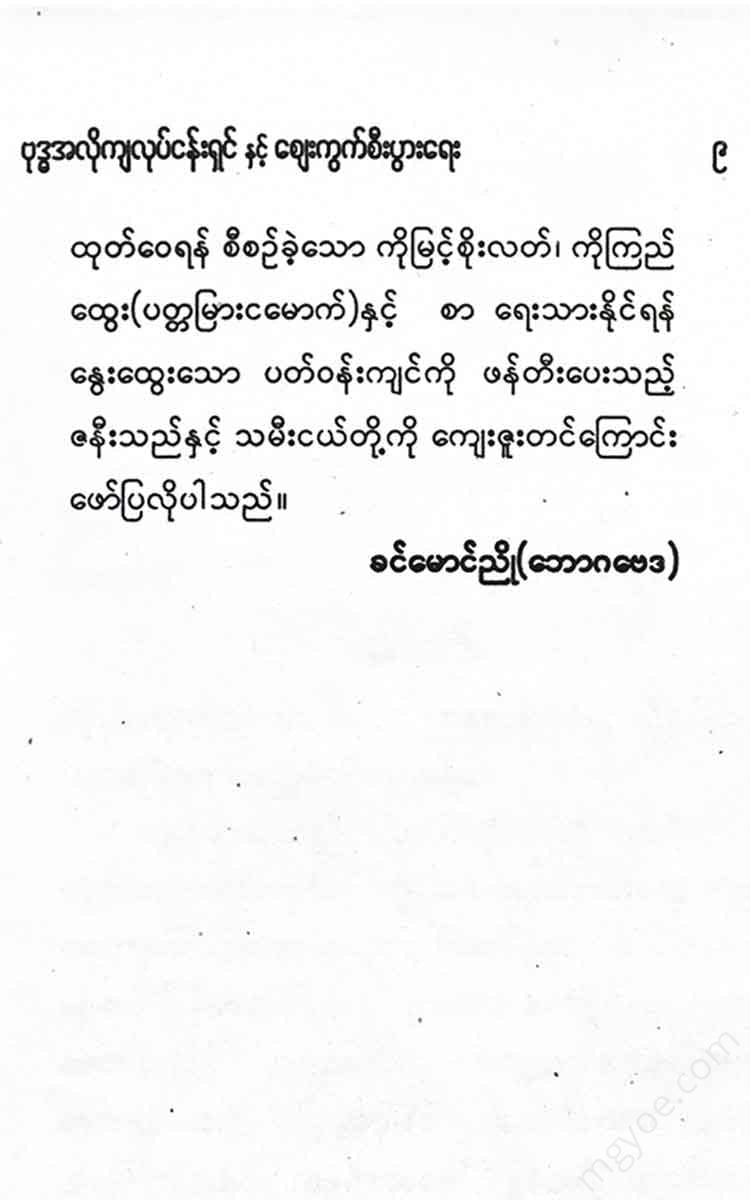စိတ်ကူးချိုချိုစာပေ
Khin Maung Nyo (Economics) - Entrepreneur and Market Economy According to Buddhism
Khin Maung Nyo (Economics) - Entrepreneur and Market Economy According to Buddhism
Couldn't load pickup availability
Entrepreneur according to Buddha's will (1)
I want to talk about Buddhism and entrepreneurship. Yes. Entrepreneurship is a concept that was developed in the West, in France, in America, in England. But there are entrepreneurs in the East too.
Therefore, we would like to highlight some of the natural principles that are useful in the worldly sphere, the field of leadership, and the field of business from the teachings of the Buddha. Mainly
1. Remember (not forgetting)
2. Anatta (non-self)
3. Wabi (contentment)
4. Immortality (impermanence)
5. Equanimity (ability to endure worldly pleasures)
I want to discuss. A fully fledged Buddhist would be a good entrepreneur and a good leader in the Buddhist sense. However, I intend to show that Buddhist philosophies can help you become an effective, intelligent, and happy entrepreneur. I do not want you to worry about whether the Dhamma should be brought into the world of business. In fact, Buddhist philosophies have been said to have influenced not only Asian thought but also great figures like Tolstoy. The teachings of other religious leaders also contain teachings that are relevant for entrepreneurs and leaders, but they cannot be described in detail. //
1. Caution
The Buddha, whom we believe in, preached a Dhamma called “mindfulness” many times. Even at the last moment of his passing, he preached the Dhamma of Appamaddha, telling us not to lose our mindfulness or to be careless.
Is it not true that the suffering, pain, and misery we experience are caused by our own forgetfulness and negligence? As a businessperson, forgetfulness is the root cause of all losses. If only we would remember and pay attention to time constraints, deadlines, the impact of our actions on the minds of various people, and the need for cooperation, many problems that could arise could be prevented.
Delay, procrastination, and procrastination are also signs of lack of awareness. Awareness is also at the forefront of the qualities of a person who thinks ahead and plans ahead. It is also necessary to be aware so that we can not only see the end of the eyelashes, but also see the end of the mind's eye and weigh things with wisdom. If we are to think long and far, we should not look at one room, one month, one year, or just once, but should look at it from decades to centuries. When we do not look far and wide, we tend to think that a glass of water, a meal, or a meal is good for us.
Matsushita Corporation, Japan, says it has a 250-year plan for its organization. What might happen in the future? How do you respond to those events, how do you prepare for them, and what do you do to increase value without letting your energy dissipate and go to waste? It's all about awareness.
2. Ananta
I have heard the Taungmyo Sayadaw say that there are times when even a million people have gone astray and returned.
But in reality, we are all just me. We think we are the government. Our egos are too big, our egos are too big, and the government thinks and acts like it can't govern. When we think that we have power, we act like it can't govern.
I will tell you some of the importance of anat in the business world. An effective and successful business owner encourages his employees to give feedback and criticize. A person with a big ego does not like to be criticized or criticized. Only people with a small ego can tolerate criticism of their actions and abilities. They also encourage criticism. If there is something to criticize, no one will dare to criticize an entrepreneur or leader who only likes to be criticized, who only wants to be successful, and who does not want to hear or see failure. They will not dare to criticize in front of them, but they will criticize and criticize in secret. If you want to reduce criticism in secret, you must be able to criticize boldly in front of them.
In fact, the courage to be criticized is a kind of mentality that a businessman and a leader must cultivate. The fact that a person like Ashin Sariputta was criticized by an unknown person like Korin Lay for not being in the right line of the robe can be said to be due to Ashin Sariputta's courage to be criticized and his low self-esteem. Since Korin Lay's criticism was correct, it can be seen that Ashin Sariputta respected him. In other words, Ashin Sariputta set an example of being criticized, being able to be criticized, and being able to be criticized.
They don't like criticism, so they don't know they're wrong. They don't know they're losing, they don't know they're failing, they don't know they're failing. They tend to cover themselves up so that everyone can see them. "Nod your head, listen to your heart, be right."
The first messenger is called. “All is well, sir,” the first messenger is called. If you are not yet a person of great talent, no one is perfect, no one is to blame. Even if you are not perfect, pretending to be perfect, thinking you are perfect, deceiving yourself, and wanting others to like you are perfect are the things of people with a big ego.
When choosing subordinates, what kind of person will you choose? Will you choose someone who is better than you, someone who is your equal, or someone who is worse than you? Answer carefully. You will most likely choose someone who is worse than you. If you choose someone who is your equal, you will be afraid that you will be better than you. Choosing someone who has more knowledge and experience than you is not something to even think about.
If someone who is inferior to you does the work, it can be worse than you do. From an ego perspective, it is satisfying, but from a business perspective, it is very painful. Only people with low ego can tolerate being surrounded by talented and brilliant people. People with big egos are often surrounded by yes-men, nod-men, people who don't dare to speak up, and people who are not qualified.
An effective and intelligent entrepreneur must be willing to make mistakes. To be told of mistakes. To learn from mistakes. Leaders and entrepreneurs who are willing to take responsibility for and apologize for the mistakes of others who were responsible for them, even if they were not their own, have great courage.
People with big egos want everyone to like them and to be liked. They are the three-wheeled boatmen who demand everything in order to get along with everyone they meet. In fact, getting along with everyone and following everyone's preferences is not something that any human being, even gods, devas, Buddhas, and arahants, can do. If you follow everyone's preferences, you will only end up disliking everyone.
As an effective and smart entrepreneur, you have to be willing to say no when necessary. You have to make decisions that some people don't want. You have to do what you have to do, even if it's not popular, to fulfill your responsibilities and to succeed in your business. You have to be selfless.
Again, excellent businessmen are not afraid to praise their subordinates, and it is not difficult to praise them. Many businessmen often say that their employees are loyal to them. How many times have you praised your employees? Have you ever praised them? I have heard that if you praise them too much, they will go up and become difficult to control. What about if you demote them? Can you control them? Can you control them? I want to ask. Praise does not only mean a salary increase. It also includes things like raising the status, giving more responsibilities, delegating authority, and giving rewards. There is a saying that no one who is promoted can escape from the bottom, but if you push too hard, they will rise. If you push your subordinates to be successful, to be famous, and to be famous, your subordinates will not bow down. If you take your place everywhere, you will only do your own thing, and if you have a big ego, you will be left alone.
Businessmen with big egos want to be powerful. They want to be influential. They show off their power excessively. They are quick-tempered and easily angered. They have no self-control. They are rude to others. They are lustful. They drink excessively. They have many lustful affairs. They are arrogant. They use big offices, big desks, and nice cars to show off.
Wise entrepreneurs value substance over appearance. They do not consider themselves important, and they prefer responsibility to the business rather than the guests. They emphasize the importance, breadth, and relevance of their business, their organization, and their employees more than themselves. They share the joy of success. They firmly believe that it is not because they are the best, but because many people work together. They have a broader view than personal satisfaction and dissatisfaction. They are open-minded and broad-minded. They can forgive any situation that affects the purpose of the business.




